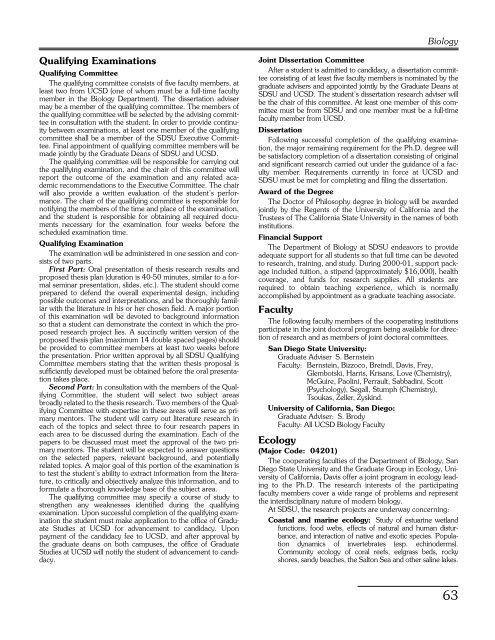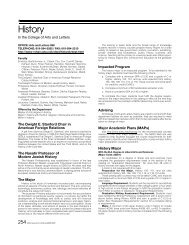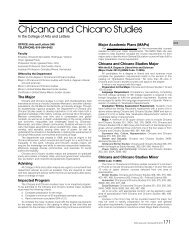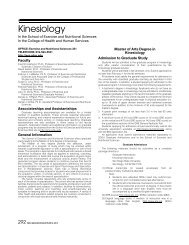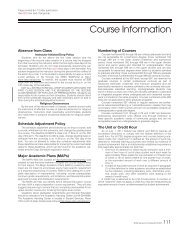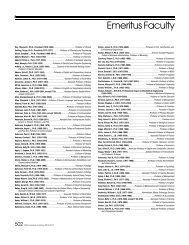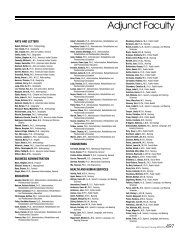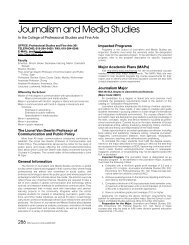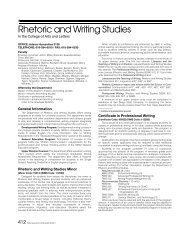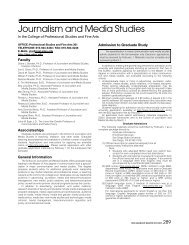President Stephen L. Weber - San Diego State University ...
President Stephen L. Weber - San Diego State University ...
President Stephen L. Weber - San Diego State University ...
You also want an ePaper? Increase the reach of your titles
YUMPU automatically turns print PDFs into web optimized ePapers that Google loves.
Qualifying Examinations<br />
Qualifying Committee<br />
The qualifying committee consists of five faculty members, at<br />
least two from UCSD (one of whom must be a full-time faculty<br />
member in the Biology Department). The dissertation adviser<br />
may be a member of the qualifying committee. The members of<br />
the qualifying committee will be selected by the advising committee<br />
in consultation with the student. In order to provide continuity<br />
between examinations, at least one member of the qualifying<br />
committee shall be a member of the SDSU Executive Committee.<br />
Final appointment of qualifying committee members will be<br />
made jointly by the Graduate Deans of SDSU and UCSD.<br />
The qualifying committee will be responsible for carrying out<br />
the qualifying examination, and the chair of this committee will<br />
report the outcome of the examination and any related academic<br />
recommendations to the Executive Committee. The chair<br />
will also provide a written evaluation of the student’s performance.<br />
The chair of the qualifying committee is responsible for<br />
notifying the members of the time and place of the examination,<br />
and the student is responsible for obtaining all required documents<br />
necessary for the examination four weeks before the<br />
scheduled examination time.<br />
Qualifying Examination<br />
The examination will be administered in one session and consists<br />
of two parts.<br />
First Part: Oral presentation of thesis research results and<br />
proposed thesis plan (duration is 40-50 minutes, similar to a formal<br />
seminar presentation, slides, etc.). The student should come<br />
prepared to defend the overall experimental design, including<br />
possible outcomes and interpretations, and be thoroughly familiar<br />
with the literature in his or her chosen field. A major portion<br />
of this examination will be devoted to background information<br />
so that a student can demonstrate the context in which the proposed<br />
research project lies. A succinctly written version of the<br />
proposed thesis plan (maximum 14 double spaced pages) should<br />
be provided to committee members at least two weeks before<br />
the presentation. Prior written approval by all SDSU Qualifying<br />
Committee members stating that the written thesis proposal is<br />
sufficiently developed must be obtained before the oral presentation<br />
takes place.<br />
Second Part: In consultation with the members of the Qualifying<br />
Committee, the student will select two subject areas<br />
broadly related to the thesis research. Two members of the Qualifying<br />
Committee with expertise in these areas will serve as primary<br />
mentors. The student will carry out literature research in<br />
each of the topics and select three to four research papers in<br />
each area to be discussed during the examination. Each of the<br />
papers to be discussed must meet the approval of the two primary<br />
mentors. The student will be expected to answer questions<br />
on the selected papers, relevant background, and potentially<br />
related topics. A major goal of this portion of the examination is<br />
to test the student’s ability to extract information from the literature,<br />
to critically and objectively analyze this information, and to<br />
formulate a thorough knowledge base of the subject area.<br />
The qualifying committee may specify a course of study to<br />
strengthen any weaknesses identified during the qualifying<br />
examination. Upon successful completion of the qualifying examination<br />
the student must make application to the office of Graduate<br />
Studies at UCSD for advancement to candidacy. Upon<br />
payment of the candidacy fee to UCSD, and after approval by<br />
the graduate deans on both campuses, the office of Graduate<br />
Studies at UCSD will notify the student of advancement to candidacy.<br />
Biology<br />
Joint Dissertation Committee<br />
After a student is admitted to candidacy, a dissertation committee<br />
consisting of at least five faculty members is nominated by the<br />
graduate advisers and appointed jointly by the Graduate Deans at<br />
SDSU and UCSD. The student’s dissertation research adviser will<br />
be the chair of this committee. At least one member of this committee<br />
must be from SDSU and one member must be a full-time<br />
faculty member from UCSD.<br />
Dissertation<br />
Following successful completion of the qualifying examination,<br />
the major remaining requirement for the Ph.D. degree will<br />
be satisfactory completion of a dissertation consisting of original<br />
and significant research carried out under the guidance of a faculty<br />
member. Requirements currently in force at UCSD and<br />
SDSU must be met for completing and filing the dissertation.<br />
Award of the Degree<br />
The Doctor of Philosophy degree in biology will be awarded<br />
jointly by the Regents of the <strong>University</strong> of California and the<br />
Trustees of The California <strong>State</strong> <strong>University</strong> in the names of both<br />
institutions.<br />
Financial Support<br />
The Department of Biology at SDSU endeavors to provide<br />
adequate support for all students so that full time can be devoted<br />
to research, training, and study. During 2000-01, support package<br />
included tuition, a stipend (approximately $16,000), health<br />
coverage, and funds for research supplies. All students are<br />
required to obtain teaching experience, which is normally<br />
accomplished by appointment as a graduate teaching associate.<br />
Faculty<br />
The following faculty members of the cooperating institutions<br />
participate in the joint doctoral program being available for direction<br />
of research and as members of joint doctoral committees.<br />
<strong>San</strong> <strong>Diego</strong> <strong>State</strong> <strong>University</strong>:<br />
Graduate Adviser S. Bernstein<br />
Faculty: Bernstein, Bizzoco, Breindl, Davis, Frey,<br />
Glembotski, Harris, Krisans, Love (Chemistry),<br />
McGuire, Paolini, Perrault, Sabbadini, Scott<br />
(Psychology), Segall, Stumph (Chemistry),<br />
Tsoukas, Zeller, Zyskind.<br />
<strong>University</strong> of California, <strong>San</strong> <strong>Diego</strong>:<br />
Graduate Adviser: S. Brody<br />
Faculty: All UCSD Biology Faculty<br />
Ecology<br />
(Major Code: 04201)<br />
The cooperating faculties of the Department of Biology, <strong>San</strong><br />
<strong>Diego</strong> <strong>State</strong> <strong>University</strong> and the Graduate Group in Ecology, <strong>University</strong><br />
of California, Davis offer a joint program in ecology leading<br />
to the Ph.D. The research interests of the participating<br />
faculty members cover a wide range of problems and represent<br />
the interdisciplinary nature of modern biology.<br />
At SDSU, the research projects are underway concerning:<br />
Coastal and marine ecology: Study of estuarine wetland<br />
functions, food webs, effects of natural and human disturbance,<br />
and interaction of native and exotic species. Population<br />
dynamics of invertebrates (esp. echinoderms).<br />
Community ecology of coral reefs, eelgrass beds, rocky<br />
shores, sandy beaches, the Salton Sea and other saline lakes.<br />
63


